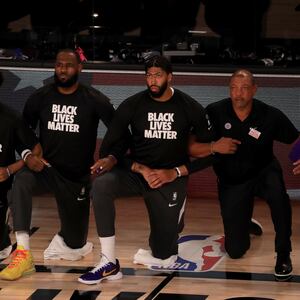When the Milwaukee Bucks brought the NBA’s $190 million Orlando Bubble to a sudden halt in 2020 over issues of social justice and policing, it looked like the end of the NBA’s very expensive pandemic experiment. Uncertainty gripped ESPN’s Disney Wide World of Sports Complex: Would the Bucks, a favorite contender for the championship in the league’s restart, take the floor? Would other teams follow suit and refuse to play?
As the silence stretched on and a small handful of reporters inside gathered outside Milwaukee’s temporary locker room, the Bucks themselves were actually very busy.
“We were in that room brainstorming. Writing on the board what we could do, what the process was going to look like, who we could reach out to, how we could impact,” Sterling Brown says on a call with The Daily Beast, remembering that when the digital clock in the locker room ticked down to game time, no one was “just sitting and taking [in] that moment”.
ADVERTISEMENT
“There was a lot going on in those few hours. It was big, it was impactful,” Brown says.
Brown, who has said in the past that he didn’t necessarily grow up wanting to be an activist, had the impetus for his own advocacy violently set upon him in his rookie year. Stopping at a Walgreens in late January 2018 on his way home for the night, Brown pulled into an empty parking lot and parked across two handicapped spaces. Coming out of the store less than two minutes later, he was approached by a Milwaukee cop on patrol who’d seen Brown leave the store. The officer asked Brown to produce his driver’s license and move away from his car, while making physical contact with Brown and telling him he “owned” the right to tell Brown what to do. The disturbing body camera footage shows a cop escalating a situation, repeatedly demanding Brown back up and away from his own car and the officer, jostling forward again and again, his voice barbed and edgy.
Within minutes, with the initial officer having stalled his way from a parking citation to an opportunity for excessive force, eight other cops arrived. Brown’s cadence never changed. He was calm, in a state of restraint unnatural as cruelly necessary, as his arms were yanked behind him and he was violently forced to the wet, icy ground and tased by an officer who, seconds earlier, also drew his gun on Brown. Brown screamed in pain and an officer off-camera can be heard, scoffing, “What’s wrong with these people, man?”
Brown was handcuffed and shoved in a cruiser, unlawfully questioned and detained overnight, his car searched without a warrant. When he was released without charges early the next morning he didn’t go home and sit with it, he went to practice.
“I was able to get out of the cell in enough time to make it to shootaround. As I did that I broke it to the team what had happened,” Brown recalls. “I know the preparation for what a game is. If I’m able to walk, breathe, eat, sleep and wake up the next day, then I gotta prepare for a game.”
Brown fell back on his rhythm as a professional to navigate the immediate fallout of that night and the season that followed. Asked if he ever thinks about how the incident shaped his first year in the league, a difficult thing to navigate in its own right, Brown pauses. “I haven’t really thought about that,” he says, “I was young, and had a lot of—I still do have—a lot of passion and love for the game, it’s what I do, it’s what I think about every day.
“I still have to live both lives. I’m still a professional athlete, and I’m still a man, and at the end of the day it was something that I had to just keep dealing with,” Brown continues, “I couldn’t sit back and dwell on the event that happened the night before. And I’ve never been like that. I always deal with something accordingly. I deal with it based on what’s going to make results and what’s going to make sense. I’m not one to sit around on things and ponder too long, I’m one to just move on to the next step. How can I put something in place, what can I do about it? That’s my mentality.”
Brown set himself to work on the glaring brutality of his case as quickly as he was back out on the floor, filing a federal civil rights suit against the Milwaukee Police Department, and the City of Milwaukee in June 2018. Brown rejected a $400,000 settlement offer from the city in December 2019, emphasizing that the money was secondary to his original request that any settlement include an admission of constitutional violence and a commitment to policing changes.
What Brown was quietly fighting for resurfaced tragically in the murder of George Floyd by Minneapolis police in spring 2020, which set off a roiling wave of social justice protests first nationally, then globally. With the NBA suspended due to COVID, many of its athletes took part in protests individually and as franchises, wanting, like everyone involved, immediate police reform. In Milwaukee, Brown led a crowd of over 7,500 people.
With plans for the NBA’s pandemic Bubble in motion, many players voiced their reluctance at returning to competition with more important things at stake, citing worries that momentum for the social justice movement might taper off. NBA Commissioner Adam Silver and the NBA’s Players Union promised prominent social justice messaging when gameplay returned but delivered a mix of predictable signage and strange concessions, like a list of 29 pre-approved messages, including “Peace”, “Equality” and “I Can’t Breathe,” to be additionally printed alongside each player’s name on their jerseys. Still, players upped the ante where possible, kneeling during national anthems to empty arenas and lending their voices and resources to what was going on outside.
Then, less than a month into the Bubble, on August 23, 2020, Jacob Blake was shot seven times by police in Kenosha, Wisconsin.
The grief and frustration from players was palpable in their postgame interviews and on social media, with some, like Toronto Raptors player Fred VanVleet, acknowledging that boycotting games had been discussed in a team meeting. Three days later, the Bucks surprised everyone by refusing to take the floor for Game 5 of their playoff series against the Orlando Magic; and Brown, who along with George Hill was the first to say they wouldn’t play, was once again at the forefront of activist action.
After three hours in the locker room, the team emerged into a cramped hallway with Brown and Hill reading the statement the group had prepared. They were adamant: They didn’t believe there had been enough meaningful change or reforms in the wider world since the murder of George Floyd, so there could be no basketball. For how straightforward the statement was, there was no sense of how intense the last few hours had been for Brown and his teammates. Looking for a place to start, they’d called Jacob Blake’s parents.
“That call was very emotional,” Brown remembers, “They cried on the phone. A couple of the guys on the team cried. A couple of coaches cried and felt the impact. [It was] just us giving them words of encouragement, and them being so appreciative of it. That call was one of the most important and one of the best phone calls I’ve ever been a part of or been on.”
Brown, who said the call felt like a lifeline, noted it was also important, “on both ends.”
“For us to reach out and show support and for them to be able to see that they’re not just going about living life and nothing’s happening, nobody’s noticing and nobody’s doing anything,” he says.
That call was a catalyst for the next one, to the lieutenant governor of Wisconsin, Mandela Barnes, and Attorney General Josh Paul, but would land Brown and his team at the other end of the emotional spectrum, frustrated when they discovered that the state legislature hadn’t met once during the ongoing social justice protests.
“It definitely gave myself and a couple of guys in the locker room clarity. It allowed us to see the process and how the state, or the city, tried to deal with things,” Brown says, “For them not to meet for months during the whole George Floyd thing, and how everybody in the world was witnessing it and trying to do something and get involved?”
He also remembers that for the Bucks that season, with “a few European guys on the team” who hadn’t necessarily experienced the same racist acts their Black teammates had, the call reinforced that clarity. The wildcat strike that the Bucks led that day would impress a similar appeal on people watching at home. There, unfolding in their living rooms or on their phones, was something unprecedented. With the game stopped and the Bubble on the verge of bursting, there was nowhere else to look.
“There are a lot of people who live their lives focused on whatever their job is, or focused on one thing, and they don’t pay attention to other industries. I know a lot of people who work everyday, regular nine-to-fives, or work in the corporate world, and they don’t pay attention to sports,” Brown says, “What we did impacting the sports industry was huge because we were able to turn a lot of heads and make a lot of noise. We put a lot of people alert to some things that they just might not be understanding, or seeing, on an everyday basis.”
What followed was a snowball effect that rolled over almost every other major pro league. The WNBA, MLB, NHL, and MLS faced the same game stoppages, and the NBA ceased for the next three days. The strike culminated with a heated players-only meeting to discuss whether or not the season should resume. It did, but with the caveat that actionable social justice reforms follow, like converting arenas to voting centers for the impending presidential election.
“It was a touchy topic and a touchy situation to be in,” Brown recalls of the meeting. “It wasn’t just basketball on my mind at the time. Now I have kids, but then I had nieces and nephews that were running around in some of these same neighborhoods. It’s bigger than just me and basketball.”
Ultimately, Brown was in favor of continuing the playoffs. He looks at the decision the same way he does the other events he’s been part of or witnessed that have spurred him to action. “The world’s not just going to stop just because we decide never to play basketball again. The police brutality, the racism. Everything is not going to stop. It’s a fight. It’s been going on for so long it’s not just going to change over one night a week, a month, a year, it’s going to take a long time.”
The Bucks had an earlier exit than anticipated from the Bubble, but the team and Brown went back to Milwaukee and focused on furthering what they’d started in Orlando. More personally, Brown wanted to work on the foundation he’d started with his brother Sharon, called SALUTE. Located in Maywood, Illinois where the two grew up, the Brown brothers started with basketball camps for kids, but have gradually been expanding the resources offered to extend to adolescent and adult programs ranging from sports skills clinics to financial literacy classes, plus specific programs for women and for mental health.
“Not every kid’s going to be able to make it professionally. That’s just the reality,” Brown stresses when asked why it was important to offer a wide range of resources, “We just wanted to touch as many people as we can, and the different avenues they might want to succeed in. So we’ve got to make an impact in a different way.”
He acknowledges that while it’s difficult to have a foundation and not be involved hands-on in its day-to-day operations he’s enjoyed partnering with other organizations and brainstorming what’s next, “That’s the fun part of having a foundation,” he says.
Brown reached a settlement with the City of Milwaukee in May 2021, under terms that revised anti-racist policing policies, promised development of education and outreach projects, and offered him an apology for the treatment he received at the hands of Milwaukee police. The $750,000 monetary settlement will go toward SALUTE. It was a long process during a pandemic, a social justice reckoning, and Brown finding himself a few times standing up in front of thousands of people, demanding something different. Maybe it’s because he doesn’t see himself as a traditional activist, but just a person doing what he believes is right, that makes his voice such a compelling one.
“I’m not sure, I hope so,” Brown says softly, “People might find it more authentic. But I really don’t know. My viewpoint still hasn’t changed, but those opportunities presented themselves and allowed me to use my platform in a powerful and impactful way. I couldn’t turn that down.”
In last year’s truncated NBA season, where the reality of the pandemic the Bubble had kept out crept back in, Brown moved on from Milwaukee, signing with the Houston Rockets. At the start of the current season, he was traded to the Dallas Mavericks and moved back to where he played in college, before his NBA career and any of the impetus for the last four years occurred. Asked if the physical distance has given him a different perspective, or time to process everything that’s happened, Brown demurs. He returns instead to the way he dealt with the violence he faced that winter night from Milwaukee police: finding a way forward through the habit of action.
“I’ve had time to process it, and I’ve also had time to do things about it. I’ve had time to sit down with the chief of police, and the city attorneys, and see how we could implement and do things to create change. I’ve had time to get discipline measures implemented. I’ve had time, along with my lawyer, to get certain laws and procedures changed within the city of Milwaukee. I’ve had time to continue to establish my foundation and speak and tell my story,” he says, his voice rising, rhythmic, “I’ve had plenty of time to think about it, and think about what I can get from it and how I can make an impact with what happened.”







